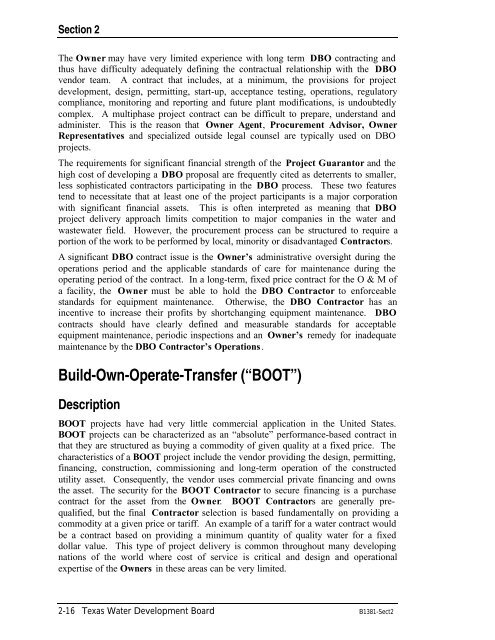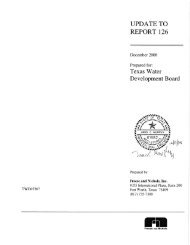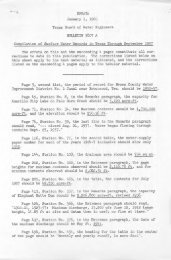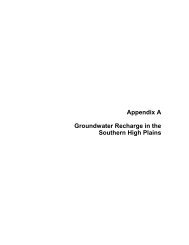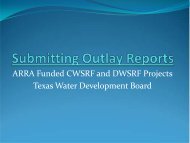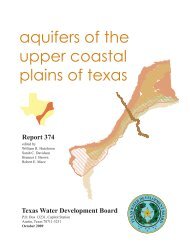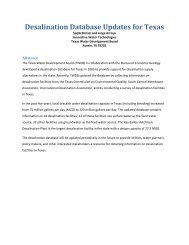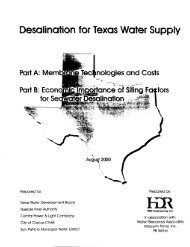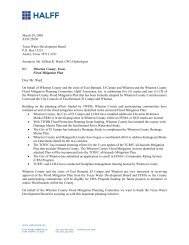Alternative Project Delivery - Texas Water Development Board
Alternative Project Delivery - Texas Water Development Board
Alternative Project Delivery - Texas Water Development Board
You also want an ePaper? Increase the reach of your titles
YUMPU automatically turns print PDFs into web optimized ePapers that Google loves.
Section 2<br />
The Owner may have very limited experience with long term DBO contracting and<br />
thus have difficulty adequately defining the contractual relationship with the DBO<br />
vendor team. A contract that includes, at a minimum, the provisions for project<br />
development, design, permitting, start-up, acceptance testing, operations, regulatory<br />
compliance, monitoring and reporting and future plant modifications, is undoubtedly<br />
complex. A multiphase project contract can be difficult to prepare, understand and<br />
administer. This is the reason that Owner Agent, Procurement Advisor, Owner<br />
Representatives and specialized outside legal counsel are typically used on DBO<br />
projects.<br />
The requirements for significant financial strength of the <strong>Project</strong> Guarantor and the<br />
high cost of developing a DBO proposal are frequently cited as deterrents to smaller,<br />
less sophisticated contractors participating in the DBO process. These two features<br />
tend to necessitate that at least one of the project participants is a major corporation<br />
with significant financial assets. This is often interpreted as meaning that DBO<br />
project delivery approach limits competition to major companies in the water and<br />
wastewater field. However, the procurement process can be structured to require a<br />
portion of the work to be performed by local, minority or disadvantaged Contractors.<br />
A significant DBO contract issue is the Owner’s administrative oversight during the<br />
operations period and the applicable standards of care for maintenance during the<br />
operating period of the contract. In a long-term, fixed price contract for the O & M of<br />
a facility, the Owner must be able to hold the DBO Contractor to enforceable<br />
standards for equipment maintenance. Otherwise, the DBO Contractor has an<br />
incentive to increase their profits by shortchanging equipment maintenance. DBO<br />
contracts should have clearly defined and measurable standards for acceptable<br />
equipment maintenance, periodic inspections and an Owner’s remedy for inadequate<br />
maintenance by the DBO Contractor’s Operations.<br />
Build-Own-Operate-Transfer (“BOOT”)<br />
Description<br />
BOOT projects have had very little commercial application in the United States.<br />
BOOT projects can be characterized as an “absolute” performance-based contract in<br />
that they are structured as buying a commodity of given quality at a fixed price. The<br />
characteristics of a BOOT project include the vendor providing the design, permitting,<br />
financing, construction, commissioning and long-term operation of the constructed<br />
utility asset. Consequently, the vendor uses commercial private financing and owns<br />
the asset. The security for the BOOT Contractor to secure financing is a purchase<br />
contract for the asset from the Owner. BOOT Contractors are generally prequalified,<br />
but the final Contractor selection is based fundamentally on providing a<br />
commodity at a given price or tariff. An example of a tariff for a water contract would<br />
be a contract based on providing a minimum quantity of quality water for a fixed<br />
dollar value. This type of project delivery is common throughout many developing<br />
nations of the world where cost of service is critical and design and operational<br />
expertise of the Owners in these areas can be very limited.<br />
2-16 <strong>Texas</strong> <strong>Water</strong> <strong>Development</strong> <strong>Board</strong> B1381-Sect2


